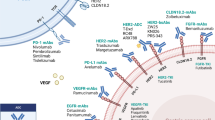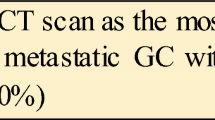Abstract
Background
The benefit of adjuvant chemotherapy for locally advanced gastric cancer (LAGC) patients with DNA mismatch repair (MMR) deficiency (D-MMR) is controversial due to concerns about its potential detrimental effect. The PRODIGY trial showed the survival benefit of adding preoperative docetaxel, oxaliplatin, and S-1 (DOS) to surgery plus postoperative S-1 for LAGC patients. In this sub-analysis, we evaluated the benefit of preoperative DOS according to MMR status.
Methods
Among patients enrolled in the PRODIGY trial treated with either preoperative DOS followed by surgery and postoperative S-1 (CSC arm), or surgery and postoperative S-1 (SC arm) at Asan Medical Center (n = 249), those in the full analysis set with available tissue to assess MMR status were included in the present analysis.
Results
A total of 231 patients (CSC arm, n = 108; SC arm, n = 123) were included (median age, 58 years [range, 27–75]), and 21 patients (CSC arm, n = 8 [7.4%]; SC arm, n = 13 [10.6%]) had D-MMR tumors. Progression-free survival and overall survival tended to be superior in the CSC arm than in the SC arm among D-MMR patients (HR 0.48 [95% CI 0.09–2.50]; log-rank P = 0.37 and HR 0.55 [95% CI 0.11–2.86]; log-rank P = 0.46, respectively), as well as among proficient MMR (P-MMR) patients (HR 0.68 [95% CI 0.46–1.03]; log-rank P = 0.07 and HR 0.75 [95% CI 0.49–1.14]; log-rank P = 0.17, respectively).
Conclusion
Preoperative DOS followed by surgery and postoperative S-1 may be considered a treatment option for LAGC patients regardless of MMR status.



Similar content being viewed by others
References
Siegel RL, Miller KD, Jemal A. Cancer statistics, 2018. CA Cancer J Clin. 2018;68:7–30.
National Comprehensive Cancer Network. Gastric Cancer (Version 2.2022). [Internet]April 15, 2022]. Available from: https://www.nccn.org/guidelines/guidelines-detail?category=1&id=1434.
Cunningham D, Allum WH, Stenning SP, Thompson JN, Van de Velde CJ, Nicolson M, et al. Perioperative chemotherapy versus surgery alone for resectable gastroesophageal cancer. N Engl J Med. 2006;355:11–20.
Al-Batran SE, Homann N, Pauligk C, Goetze TO, Meiler J, Kasper S, et al. Perioperative chemotherapy with fluorouracil plus leucovorin, oxaliplatin, and docetaxel versus fluorouracil or capecitabine plus cisplatin and epirubicin for locally advanced, resectable gastric or gastro-oesophageal junction adenocarcinoma (FLOT4): a randomised, phase 2/3 trial. Lancet. 2019;393:1948–57.
Sakuramoto S, Sasako M, Yamaguchi T, Kinoshita T, Fujii M, Nashimoto A, et al. Adjuvant chemotherapy for gastric cancer with S-1, an oral fluoropyrimidine. N Engl J Med. 2007;357:1810–20.
Bang YJ, Kim YW, Yang HK, Chung HC, Park YK, Lee KH, et al. Adjuvant capecitabine and oxaliplatin for gastric cancer after D2 gastrectomy (CLASSIC): a phase 3 open-label, randomised controlled trial. Lancet. 2012;379:315–21.
Zhang X, Liang H, Li Z, Xue Y, Wang Y, Zhou Z, et al. Perioperative or postoperative adjuvant oxaliplatin with S-1 versus adjuvant oxaliplatin with capecitabine in patients with locally advanced gastric or gastro-oesophageal junction adenocarcinoma undergoing D2 gastrectomy (RESOLVE): an open-label, superiority and non-inferiority, phase 3 randomised controlled trial. Lancet Oncol. 2021;22:1081–92.
Kang YK, Yook JH, Park YK, Lee JS, Kim YW, Kim JY, et al. PRODIGY: a phase iii study of neoadjuvant docetaxel, oxaliplatin, and S-1 plus surgery and adjuvant S-1 versus surgery and adjuvant S-1 for resectable advanced gastric cancer. J Clin Oncol. 2021;39:2903–13.
Kim H-D, Yook JH, Park Y-K, Kim Y-W, Kim JY, Ryu M-H, et al. Neoadjuvant docetaxel, oxaliplatin, and s-1 plus surgery and adjuvant s-1 for resectable advanced gastric cancer: final survival outcomes of the randomized phase 3 PRODIGY trial. J Clin Oncol. 2023;41:4067.
Nakamura Y, Kawazoe A, Lordick F, Janjigian YY, Shitara K. Biomarker-targeted therapies for advanced-stage gastric and gastro-oesophageal junction cancers: an emerging paradigm. Nat Rev Clin Oncol. 2021;18:473–87.
Angela N, Bartley PLF, Russell R. Broaddus, Chanjuan Shi.(2018) Template for reporting results of DNA Mismathc Repair Testing in Patients Being Considered for Checkpoint Inhibitor Immunotherapy. [Internet] College of American Pathologists; c2018April 15, 2022]. Available from: https://documents.cap.org/protocols/cp-general-dnamismatchrepair-18biomarker-1001.pdf.
Smyth EC, Wotherspoon A, Peckitt C, Gonzalez D, Hulkki-Wilson S, Eltahir Z, et al. Mismatch repair deficiency, microsatellite instability, and survival: an exploratory analysis of the Medical Research Council Adjuvant Gastric Infusional Chemotherapy (MAGIC) trial. JAMA Oncol. 2017;3:1197–203.
Choi YY, Kim H, Shin SJ, Kim HY, Lee J, Yang HK, et al. Microsatellite instability and programmed cell death-ligand 1 expression in Stage II/III gastric cancer: post hoc analysis of the CLASSIC randomized controlled study. Ann Surg. 2019;270:309–16.
Pietrantonio F, Miceli R, Raimondi A, Kim YW, Kang WK, Langley RE, et al. Individual patient data meta-analysis of the value of microsatellite instability as a biomarker in gastric cancer. J Clin Oncol. 2019;37:3392–400.
Sohn BH, Hwang JE, Jang HJ, Lee HS, Oh SC, Shim JJ, et al. Clinical significance of four molecular subtypes of gastric cancer identified by the cancer genome atlas project. Clin Cancer Res. 2017;23:4441–9.
Kim HD, Lee JS, Park YS, Yook JH, Noh SH, Park YK, et al. Determinants of clinical outcomes of gastric cancer patients treated with neoadjuvant chemotherapy: a sub-analysis of the PRODIGY study. Gastric Cancer. 2022;25:1039–49.
Team RC. R: a language and environment for statistical computing. [Internet] R foundation for statistical computing, Vienna, Austria, c2021. Available from: https://www.R-project.org/.
Japanese Gastric Cancer Association. Japanese Gastric Cancer Treatment Guidelines 2021 (6th ed). Gastric Cancer. 2023;26,1–25. https://doi.org/10.1007/s10120-022-01331-8.
Kim TH, Kim IH, Kang SJ, Choi M, Kim BH, Eom BW, et al. Korean practice guidelines for gastric cancer 2022: an evidence-based. Multidisciplinary Approach J Gastric Cancer. 2023;23:3–106.
Fedier A, Schwarz VA, Walt H, Carpini RD, Haller U, Fink D. Resistance to topoisomerase poisons due to loss of DNA mismatch repair. Int J Cancer. 2001;93:571–6.
Aebi S, Fink D, Gordon R, Kim HK, Zheng H, Fink JL, et al. Resistance to cytotoxic drugs in DNA mismatch repair-deficient cells. Clin Cancer Res. 1997;3:1763–7.
Giommoni E, Lavacchi D, Tirino G, Fornaro L, Iachetta F, Pozzo C, et al. Results of the observational prospective RealFLOT study. BMC Cancer. 2021;21:1086.
Al-Batran SE, Lorenzen S, Homann N, Thuss-Patience PC, Schenk M, Lindig U, et al. 1429P Pathological regression in patients with microsatellite instability (MSI) receiving perioperative atezolizumab in combination with FLOT vs. FLOT alone for resectable esophagogastric adenocarcinoma: results from the DANTE trial of the German Gastric Group at the AIO and SAKK. Ann Oncol. 2021;32:S1069.
Janjigian YY, Sanchez-Vega F, Jonsson P, Chatila WK, Hechtman JF, Ku GY, et al. Genetic predictors of response to systemic therapy in esophagogastric cancer. Cancer Discov. 2018;8:49–58.
Oh CRKE, Chae H, Park YS, Ryu MH, Kim MD, Kang YK. Prognostic value of mismatch repair deficiency in patients receiving first-line fluoropyrimidine plus platinum chemotherapy for metastatic, recurrent, or locally advanced unresectable gastric cancer. J Clin Oncol. 2023;41(suppl4):abstr 461.
Chao J, Fuchs CS, Shitara K, Tabernero J, Muro K, Van Cutsem E, et al. Assessment of pembrolizumab therapy for the treatment of microsatellite instability-high gastric or gastroesophageal junction cancer among patients in the KEYNOTE-059, KEYNOTE-061, and KEYNOTE-062 clinical trials. JAMA Oncol. 2021;7:895–902.
Janjigian YY, Van Cutsem E, Muro K, Wainberg Z, Al-Batran SE, Hyung WJ, et al. MATTERHORN: phase III study of durvalumab plus FLOT chemotherapy in resectable gastric/gastroesophageal junction cancer. Future Oncol. 2022;18:2465–73.
Pietrantonio FRA, Lonardi S, Murgioni S, Cardenllino GG, Tamberi S. INFINITY: A multicentre, single-arm, multi-cohort, phase II trial of tremelimumab and durvalumab as neoadjuvant treatment of patients with microsatellite instability-high (MSI) resectable gastric or gastroesophageal junction adenocarcinoma (GAC/GEJAC). J Clin Oncol. 2023;41(suppl4):abstr58.
André T, Tougeron D, Piessen G, de la Fouchardière C, Louvet C, Adenis A, et al. Neoadjuvant nivolumab plus ipilimumab and adjuvant nivolumab in localized deficient mismatch repair/microsatellite instability-high gastric or esophagogastric junction adenocarcinoma: The GERCOR NEONIPIGA Phase II Study. J Clin Oncol. 2023;41:255–65.
Bang YJ, Van Cutsem E, Fuchs CS, Ohtsu A, Tabernero J, Ilson DH, et al. KEYNOTE-585: Phase III study of perioperative chemotherapy with or without pembrolizumab for gastric cancer. Future Oncol. 2019;15:943–52.
Luchini C, Bibeau F, Ligtenberg MJL, Singh N, Nottegar A, Bosse T, et al. ESMO recommendations on microsatellite instability testing for immunotherapy in cancer, and its relationship with PD-1/PD-L1 expression and tumour mutational burden: a systematic review-based approach. Ann Oncol. 2019;30:1232–43.
Acknowledgements
The data analyzed were from the PRODIGY study, which was sponsored by Sanofi.
Funding
This research did not receive any specific grant from funding agencies in the public, commercial, or no-for-profit sectors.
Author information
Authors and Affiliations
Contributions
Conceptualization: YKK. Data acquisition and collection: HWC, YSP, MSM, MHR, and YKK. Data analysis: J Hyung, HWC, HDK, MHR, and YKK. Manuscript drafting: J Hyung, HDK, and YKK. Review and editing of the manuscript: All authors.
Corresponding author
Ethics declarations
Conflict of Interest
Conflicts of interest Nothing directly related to this work. Out of this work, YK Kang has served as a consultant for Liscure, ALX Oncology, Zymeworks, Amgen, Novartis, Macrogenics, Daehwa, Blueprint, Surface Oncology, BMS, and Merck (MSD). MH Ryu received an honorarium and served on the advisory boards of Ono Pharmaceutical, BMS, MSD, Lily, Taiho, Novartis, Daiichi Sankyo, and AstraZeneca, and served as a consultant for DAEHWA Pharmaceutical, BMS, Lily, and Ono Pharmaceutical.
Additional information
Publisher's Note
Springer Nature remains neutral with regard to jurisdictional claims in published maps and institutional affiliations.
Supplementary Information
Below is the link to the electronic supplementary material.
Rights and permissions
Springer Nature or its licensor (e.g. a society or other partner) holds exclusive rights to this article under a publishing agreement with the author(s) or other rightsholder(s); author self-archiving of the accepted manuscript version of this article is solely governed by the terms of such publishing agreement and applicable law.
About this article
Cite this article
Hyung, J., Cho, H., Kim, HD. et al. DNA mismatch repair deficiency and outcomes of patients with locally advanced gastric cancer treated with preoperative docetaxel, oxaliplatin, and S-1 plus surgery and postoperative S-1 or surgery plus postoperative S-1: a sub-analysis of the phase 3 PRODIGY trial. Gastric Cancer 27, 110–117 (2024). https://doi.org/10.1007/s10120-023-01434-w
Received:
Accepted:
Published:
Issue Date:
DOI: https://doi.org/10.1007/s10120-023-01434-w




